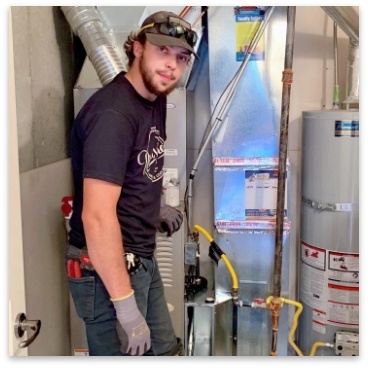Gas and electric furnaces are far more popular heating options than oil or propane. These systems can look the same but actually come with a variety of different benefits and disadvantages. While the primary difference between them is the type of fuel used, you’ll also find changes in their overall efficiency, lifespans, and installation costs. Here’s a comprehensive guide on the major distinctions between gas and electric furnaces.
Gas Furnaces
Gas-powered heating systems are reliable and known to heat the home quickly. These systems are either connected to a natural gas line or a storage tank on the property. As gas enters the furnace, the burners ignite it. The system pulls in cold air from the house that is then heated by the heat exchanger.
Once the warm air is pumped back into the home, the combustion gases in the exchanger are removed via the exhaust pipe. These systems use blower fans to ensure the heated air reaches every room, repeating the heating process until your target temperature is reached.
A common misconception is that a gas furnace will still be able to produce heat if you lose power. In reality, your heating system requires electricity for the thermostat, blower motor, and other mechanical components. Unless you have a backup generator, the vast majority of furnaces will stop working once they lose electricity.
Pros
Gas furnaces are much faster at heating the home than electric alternatives. This is the most dependable option if you frequently face freezing temperatures during the winter. Gas furnaces are also less expensive to run due to the lowered price of natural gas compared to electricity. Since these systems are so efficient, you’ll be paying much less in utility costs every month. As long as your gas furnace is regularly maintained, it will last between 15 to 20 years.
Cons
Installing both a new gas furnace as well as a gas line and ventilating system can be expensive. The installation costs are smaller if you previously had a gas furnace and only need to replace the system itself. These furnaces also tend to come with additional exhaust fans that make them overall noisier than electric options.
Gas furnaces need professional service at least twice a year to prevent safety emergencies. For example, dirty, compromised systems can create soot if they’re not efficiently burning their fuel. This black, powdery substance can worsen your air quality and stain your carpets and belongings. Maintenance is a must to prevent a cracked or damaged heat exchanger that may allow carbon monoxide into your home. Inhaling large quantities of this gas can make you feel dizzy, nauseous, and confused. Long-term exposure can put your health, and even your life, in danger.
Electric Furnaces
This type of furnace works like a very large and powerful hair dryer. Once your thermostat determines the temperature is too low, it sends a signal to the sequencer to power the heating elements. Air is then drawn into the system via the cold-air return. It passes over the heating elements or coils that have been warmed with electricity. The blower pushes that hot air back into the home, slowly raising your temperature. Just like gas furnaces, these systems also come with a heat exchanger as well as other components like a filter and blower motor.
Pros
Electric furnaces are popular in a range of homes because they’re safe, run quietly, and don’t cost a lot to install. They don’t require a gas line, making it easier to install them without breaking your budget. While they still need maintenance, they don’t require as much as gas furnaces do. It’s still important to call for care to avoid potential system shutdowns or fire hazards due to worn-out parts. These systems don’t use any natural gas, eliminating the possibility of a carbon monoxide leak. They also tend to last on average a decade longer than gas furnaces.
Cons
On the other hand, depending on your local electricity rates, you may have to pay more in utilities every month. Electricity is considered one of the most expensive power sources. You may have to sacrifice your comfort by a few degrees during the coldest days to limit your energy consumption. These systems are also typically less efficient than gas alternatives, meaning they’ll take longer to heat your home. This will result in more energy usage, which further increases your costs. Thankfully, you also have the option to choose a high-efficiency furnace or one that’s combined with a heat pump for maximum savings.
Choosing Your Ideal Furnace
Both gas and electric furnaces come with many unique home heating benefits. To decide on the best system for your household, you should consider your comfort needs, budgetary restrictions, and local laws that may prohibit some installations.
Budget
Since many homes already have a gas furnace, installing a new one is usually the cheaper option. These new systems can be connected to your existing gas line, limiting any extra construction or installation costs. Switching the type of furnace you use tends to be a more expensive project than if you just installed another similar system. Don’t forget to consider future utility costs. Gas-powered systems have lower bills but won’t live as long. Electrical furnaces have higher bills but will keep you from needing a new system for 20 to 30 years.
Safety
One of the biggest concerns with gas furnaces is the potential for leaking carbon monoxide. You can minimize this risk by installing carbon monoxide detectors in your basement near your furnace as well as the rest of your home. Regular expert care is also essential to keeping your system at peak safety and efficiency. Any gas or electric furnace can pose a risk to your home and family if it’s not properly cared for over the years.
Local Restrictions
Finally, some regions of the United States have put forth legislation to stop the installation of gas furnaces in the coming years. These systems are slowly being fazed out because of their unsafe carbon emissions. Installing an electric furnace will make your home more environmentally friendly in the long run. To learn more about any local codes or restrictions, contact our local heating company for more information. We can help you determine the furnace best suited to your family, home, and location.
Local Home Heating Company
Main Street Heating & Cooling is a trusted heating and cooling company serving Sandy, UT, and the surrounding areas. We have more than 10 years of experience delivering affordable, responsive, and speedy HVAC care. Our best-in-class technicians are always respectful and able to provide helpful answers to your questions and concerns. We’re a family-owned business that takes pride in arriving on time and fully stocked, ready to handle most HVAC issues in just one visit. Count on us to repair, maintain, or replace your furnace, heat pump, or air conditioner. We can also improve your indoor air quality, install an improved thermostat, or help you with your commercial HVAC problems. Contact Main Street Heating & Cooling to schedule a service today.


